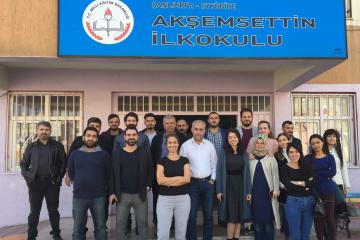European Social Inclusion Initiative (ESII)

ESII’s areas of expertise include identifying promising programmes for evaluation, funding randomised evaluations, providing training in impact evaluation for policymakers and project implementers, and disseminating research findings to diverse audiences.
What do we mean by social inclusion?
As defined by the European Foundation for the Improvement of Living and Working Conditions, “social inclusion is a process that ensures citizens have the opportunities and resources necessary to participate fully in economic, social and cultural life and to enjoy a standard of living and well-being that is considered normal in the society in which they live”.
Poverty and social exclusion can take many forms in Europe. Beyond financial constraints, people may face different structural barriers in accessing quality education, employment opportunities, housing, physical and mental health assistance, and social protection policies, as well as suffering from discrimination and marginalisation.
Social exclusion arises from complex, overlapping, systemic, and multi-dimensional causes, and can create enduring circles of exclusion for individuals and communities as a whole. The complexity and multi-dimensional aspect of social exclusion emphasise the need to find effective strategies to promote the inclusion of vulnerable and underserved individuals and communities from the early stages of life to adulthood.
The initiative is open to all policies/programmes that can advance the understanding of social exclusion and promote social inclusion in Europe, with a particular focus on education. In terms of the target population, ESII focuses on programmes/policies targeted to individuals suffering from marginalisation and vulnerability (including refugees, migrants, nationals with migrant backgrounds and ethnic minorities, among others). However, we have a particular interest in children and youth. In terms of geographical focus, ESII works broadly across Europe.
Review of existing evidence
We conducted a review of over 140 published studies on social inclusion, evaluating the effectiveness of programmes across education, employment, and migrant inclusion. Please click here for the full review and here for a summary of the key results.
Partnership opportunities
There are several possibilities for researchers, policymakers, and implementers across Europe working to improve the social inclusion of marginalised groups to get involved with ESII. These include:
Option 1: Evaluate a programme/policy
Why evaluate?
By conducting randomised evaluations, policymakers and implementers will be able to ensure that their resources are well allocated and that their actions are truly effective. Randomised evaluations provide rigorous and unbiased estimates of the causal impact of an intervention. In other words, they enable researchers, policymakers, and implementers to identify the specific changes to participants’ lives that can be attributed to the programme. Read more on randomised evaluations here.
Evaluations produce clear and credible results, allowing organisations to join a growing movement of change makers that use rigorous evidence to improve the effectiveness of their programmes. These results can generate insights that go beyond the context of the programme and that can be used by implementers, policymakers, and donors at large.
Decision-makers and project implementers
Would you like to evaluate your programme through rigorous impact evaluations? J-PAL Europe is seeking implementing partners, such as governments, NGOs, multilateral organisations, and businesses, who are interested in measuring the impact of their programmes through randomised evaluations. Organisations will work closely with J-PAL researchers to design a randomised evaluation of their programme.
Researchers
ESII RFP Round V is open and will close on October 31, 2025. Check out the ESII Request for Proposals webpage for information on how to apply.
Option 2: Training on impact evaluation for decision-makers
Are you a policymaker or project implementer interested in learning more about rigorous impact evaluations? For policymakers and implementers who are interested in better understanding how to conduct rigorous impact evaluations, J-PAL Europe offers customised training that can be tailored to an organisation’s needs.
Option 3: Using pre-existing evidence to design new policies/programmes
How can generated evidence be used to foster social inclusion in Europe? First, J-PAL produces reports on the evidence we have to date in various policy areas related to social inclusion, see for instance the European Social Inclusion Initiative Review Paper and the Evidence for Social Policy in Europe. Second, policymakers and project implementers can participate in events with like-minded institutions and experts from across Europe, exchange ideas, as well as co-host outreach events together with J-PAL Europe to promote a culture of better use of evidence and evaluation amongst European partners. See our contact details below.
How to get involved?
If you are interested in learning more about working with us, please contact [email protected] or Arantxa Rodriguez-Uribe and Ottavia Brussino, currently coordinating the initiative.






